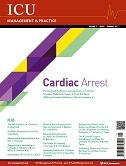Volume 17 - Issue 2, 2017
- ICU
- 28/05/2017
Change content default value
READ MORE
The “chain of survival” metaphor for improving outcomes from sudden cardiac arrest (CA) was first coined in the 1980s. Since adopted by the American Heart Association and the International Liaison Committee on Resuscitation amongst others, it is a useful tool to concentrate efforts on how to optimise every link in the chain to improve survival and...
READ MOREThe treatment of cardiac arrest has made significant progress over the last 10–15 years. This period marks a significant turning point, because the treatment of out-of-hospital cardiac arrest (OHCA) had often been considered an exercise in futility, with no improvement in outcome for the previous 30 years (Berdowski et al. 2010). In recent years, several investigators...
READ MOREMore patient lives have been saved after OHCA in recent years, but the numbers can improve further. Increased awareness, more education of laypersons and more first responders, in combination with reduced response times for the EMS and early defibrillation will save many lives The chances of surviving an out-of-hospital cardiac arrest (OHCA)...
READ MOREThis article summarises the current ratio and scientific evidence on which cardiac arrest patients could benefit from extracorporeal cardiopulmonary resuscitation. Acute cardiac arrest has a dismal prognosis even when advanced cardiac life support is initiated without delay. Extracorporeal cardiopulmonary resuscitation (eCPR) refers to a...
READ MOREThe use of APRV has many proposed benefits for patients with lung injury. However, quality evidence supporting the use of this technique is limited. This article summarises the purported benefits and limitations of routine use of the technique in the management of ARDS, and critically reviews the evidence supporting its use. Airway pressure...
READ MORECritical illness can be considered as the body’s failure to compensate for severe pathophysiological ‘stress’. The result is a vicious circle of damage that ultimately ends in organ failure, permanent harm and, unfortunately for many, death. Fortunately, the human body is remarkably resilient. It has the ability to tolerate changes to its internal...
READ MORERounds in the intensive care unit (ICU) allow for scheduled discussions in which healthcare providers review clinical information and develop care plans for critically ill patients. Despite this straightforward concept, there is widespread variability in numerous components of rounds. While some of these differences are culturally rooted and, as such,...
READ MOREJeremy Kahn is Professor of Critical Care, Medicine and Health Policy in the University of Pittsburgh School of Medicine and Graduate School of Public Health. As a core faculty member in the CRISMA Center in the Department of Critical Care Medicine, he directs the CRISMA Program on Critical Care Health Policy & Management. His research focuses on...
READ MORE